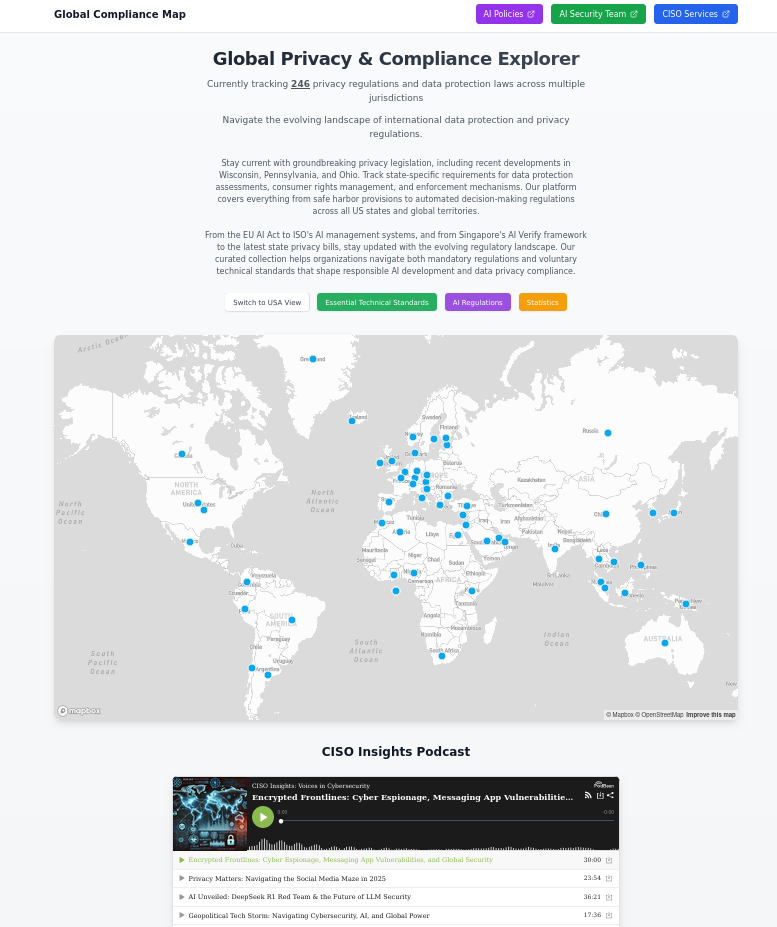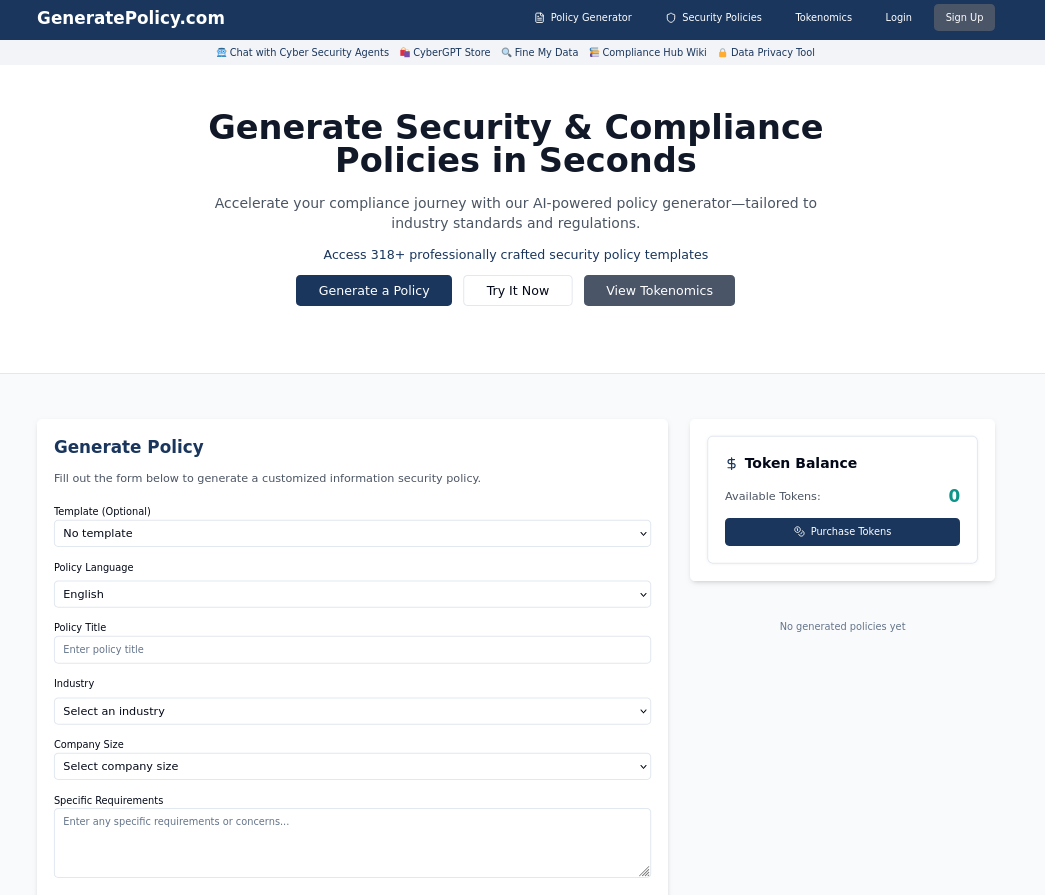Privacy Compliance Assessment Tool for CCOs, DPOs & CISOs
Navigate complex privacy regulations, assess compliance requirements, and protect your organization from data breaches and regulatory fines.
Trusted by Chief Compliance Officers (CCOs), Data Protection Officers (DPOs), and Chief Information Security Officers (CISOs) to:
- Evaluate compliance with GDPR, CCPA, HIPAA, and other privacy frameworks
- Identify gaps in privacy programs and data protection measures
- Generate customized compliance roadmaps and action plans
- Access framework-specific templates and documentation
Privacy Compliance Management for Modern Organizations
In today's digital landscape, privacy compliance is more critical than ever. Organizations face increasing scrutiny from regulators, customers, and stakeholders regarding their data protection practices. Our comprehensive assessment tool helps privacy professionals navigate:
- Global privacy regulations (GDPR, CCPA/CPRA, PIPEDA)
- Industry-specific compliance requirements (HIPAA, GLBA, FERPA)
- State-level privacy laws and regulations
- Cross-border data transfer requirements
- Data breach notification obligations
Chief Privacy Officers (CPOs) and Data Protection Officers (DPOs) rely on our tool to maintain compliance, protect sensitive data, and avoid costly penalties. Stay ahead of evolving privacy requirements and protect your organization's reputation.
Compliance Fines & Penalties
GDPR Violations
Up to €20 million or 4% of global annual revenue, whichever is higher. Recent fines include:
- Meta: €390 million (2023)
- Amazon: €746 million (2021)
- WhatsApp: €225 million (2021)
CCPA Violations
$2,500 per violation or $7,500 per intentional violation. Statutory damages of $100-$750 per consumer per incident for data breaches.
Privacy Fine Calculator
Estimate potential privacy fines based on your organization's characteristics and violation types.
Calculate Potential FinesPrivacy & Compliance Leadership Roles
Chief Privacy Officer (CPO)
Leads privacy strategy and program development. Responsible for:
- Privacy policy development and implementation
- Data protection strategy
- Privacy impact assessments
- Privacy awareness and training
Chief Information Security Officer (CISO)
Oversees information security program. Focuses on:
- Security infrastructure and controls
- Incident response planning
- Security risk assessments
- Technical compliance measures
Data Protection Officer (DPO)
GDPR-mandated role for certain organizations. Responsibilities include:
- Monitoring GDPR compliance
- Advising on data protection obligations
- Serving as contact point for supervisory authorities
- Overseeing data protection impact assessments
Chief Risk Officer (CRO)
Manages enterprise risk, including privacy-related risks:
- Privacy risk assessments
- Compliance risk management
- Third-party risk oversight
- Risk mitigation strategies
Legal & Compliance Support Network
External Privacy Counsel
Specialized legal expertise in:
- Privacy program development and assessment
- Regulatory compliance guidance
- Contract review and negotiation
- Incident response planning
Cybersecurity & Digital Forensics
Technical expertise for:
- Incident investigation and response
- Digital evidence collection and analysis
- Security vulnerability assessments
- Expert testimony in legal proceedings
Compliance Auditors & Consultants
Independent assessment of:
- Privacy program effectiveness
- Regulatory compliance status
- Control implementation
- Documentation and evidence collection
Recent Legal Trends
- • Increased class action litigation for privacy violations
- • Rising regulatory enforcement actions and fines
- • Focus on vendor management and third-party risk
- • Emphasis on privacy-by-design in product development
- • Growing importance of privacy impact assessments
Audit & Investigation Support
Regulatory Audits
- Documentation review
- Control testing
- Compliance verification
- Remediation planning
Breach Investigations
- Incident response
- Evidence preservation
- Root cause analysis
- Notification assistance
U.S. State Breach Notification Requirements
California
Notification required within 30 days of discovery. Must notify Attorney General if over 500 residents affected.
Virginia
Must notify affected residents and Attorney General within 30 days. No minimum threshold for AG notification.
Data Breach Cost Calculator
Estimate the potential costs associated with a data breach, including notification requirements, legal fees, and remediation expenses.
Calculate Breach CostsSEC 8-K Cybersecurity Incident Reporting
The SEC's new cybersecurity disclosure requirements mandate public companies to:
- •Report material cybersecurity incidents within 4 business days via Form 8-K
- •Disclose cybersecurity risk management and strategy
- •Report on board oversight of cybersecurity risks
- •Describe management's role in assessing cybersecurity risks
Important: Failure to comply with SEC reporting requirements can result in enforcement actions, penalties, and reputational damage.
Additional Regulatory Requirements
Federal Regulations
FTC Requirements
- • Section 5 unfair/deceptive practices
- • Safeguards Rule for financial institutions
- • Red Flags Rule for identity theft
- • Children's Online Privacy Protection Act (COPPA)
Healthcare Regulations
- • HIPAA Privacy & Security Rules
- • HITECH Act requirements
- • 21st Century Cures Act
- • FDA medical device regulations
Comprehensive State Privacy Laws
California
- • CCPA/CPRA (effective 1/1/2023)
- • California Privacy Rights Act
- • CalOPPA website requirements
- • "Shine the Light" law
Virginia & Colorado
- • Virginia CDPA (effective 1/1/2023)
- • Colorado Privacy Act (7/1/2023)
- • Consumer opt-out rights
- • Data protection assessments
Other States
- • Utah Consumer Privacy Act (12/31/2023)
- • Connecticut Data Privacy Act (7/1/2023)
- • Texas Data Privacy Law (7/1/2024)
- • Oregon Consumer Privacy Act (7/1/2024)
State Breach Notification Requirements
Notification Timelines
- • Florida: 30 days
- • Tennessee: 45 days
- • Vermont: 45 days
- • Oregon: 45 days
- • New York: 60 days
Special Requirements
- • Massachusetts: Written information security program (WISP)
- • New York: SHIELD Act cybersecurity requirements
- • Illinois: BIPA biometric data protections
- • Nevada: Online privacy notice requirements
Industry-Specific Requirements
Financial Services
- • GLBA Privacy & Safeguards Rules
- • NY DFS Cybersecurity Regulation
- • NAIC Insurance Data Security Model Law
- • Payment Card Industry DSS
Education
- • FERPA student privacy
- • PPRA research protections
- • State student privacy laws
- • Ed Tech privacy requirements
Critical Infrastructure
- • CISA incident reporting
- • TSA cybersecurity directives
- • Energy sector requirements
- • Water/wastewater systems
International Requirements
Cross-Border Data Transfers
- • EU Standard Contractual Clauses
- • UK International Data Transfer Agreement
- • Swiss Data Protection Requirements
- • APEC Cross-Border Privacy Rules
Country-Specific Laws
- • China PIPL requirements
- • Brazil LGPD compliance
- • Canada PIPEDA/Provincial Laws
- • Australia Privacy Principles
Cyber Insurance & Breach Response Coverage
Key Insurance Coverage Areas
First-Party Coverage
- • Business interruption losses
- • Ransomware payment reimbursement
- • Data recovery costs
- • Crisis management expenses
- • Customer notification costs
Third-Party Coverage
- • Privacy liability claims
- • Regulatory defense & penalties
- • Payment card industry fines
- • Media liability
- • Technology errors & omissions
Breach Response Services
Incident Response Team
- • Breach coach (legal counsel)
- • Forensic investigators
- • PR/Crisis communications
- • Notification vendors
- • Call center support
Credit Monitoring Services
- • Identity theft monitoring
- • Credit file monitoring
- • Dark web monitoring
- • Fraud resolution services
- • Identity theft insurance
Insurance Requirements
Many privacy regulations and business contracts require specific cyber insurance coverage:
- • HIPAA/HITECH: Healthcare organizations typically need cyber coverage
- • PCI-DSS: Merchants may require cyber insurance for card data breaches
- • GDPR: Coverage for regulatory fines and penalties (where insurable)
- • State Laws: Coverage for mandatory breach notification costs
- • B2B Contracts: Vendors often required to maintain cyber coverage
Average Coverage Limits
- Small Business: $1M - $5M
- Mid-Market: $5M - $20M
- Enterprise: $20M - $100M+
- High Risk/Regulated: Additional excess layers
Common Exclusions
- • Unencrypted portable devices
- • War/terrorism (except cyber terrorism)
- • Prior known incidents
- • Intentional regulatory violations
Insurance Premium Factors
Business Factors
- • Revenue size
- • Industry type
- • Data types
- • Geographic scope
Security Controls
- • Encryption
- • Access controls
- • Backup procedures
- • Incident response
Claims History
- • Prior incidents
- • Response handling
- • Remediation efforts
- • Loss experience

Global Privacy & Compliance Explorer
Tracking 246+ Global Privacy Regulations
Navigate the evolving landscape of international data protection and privacy regulations. Track 246+ privacy regulations and data protection laws across multiple jurisdictions.
Visit Site →
Generate Security & Compliance Policies
Accelerate your compliance journey with our AI-powered policy generator—tailored to industry standards and regulations. Access 318+ professionally crafted security policy templates.
Visit Site →